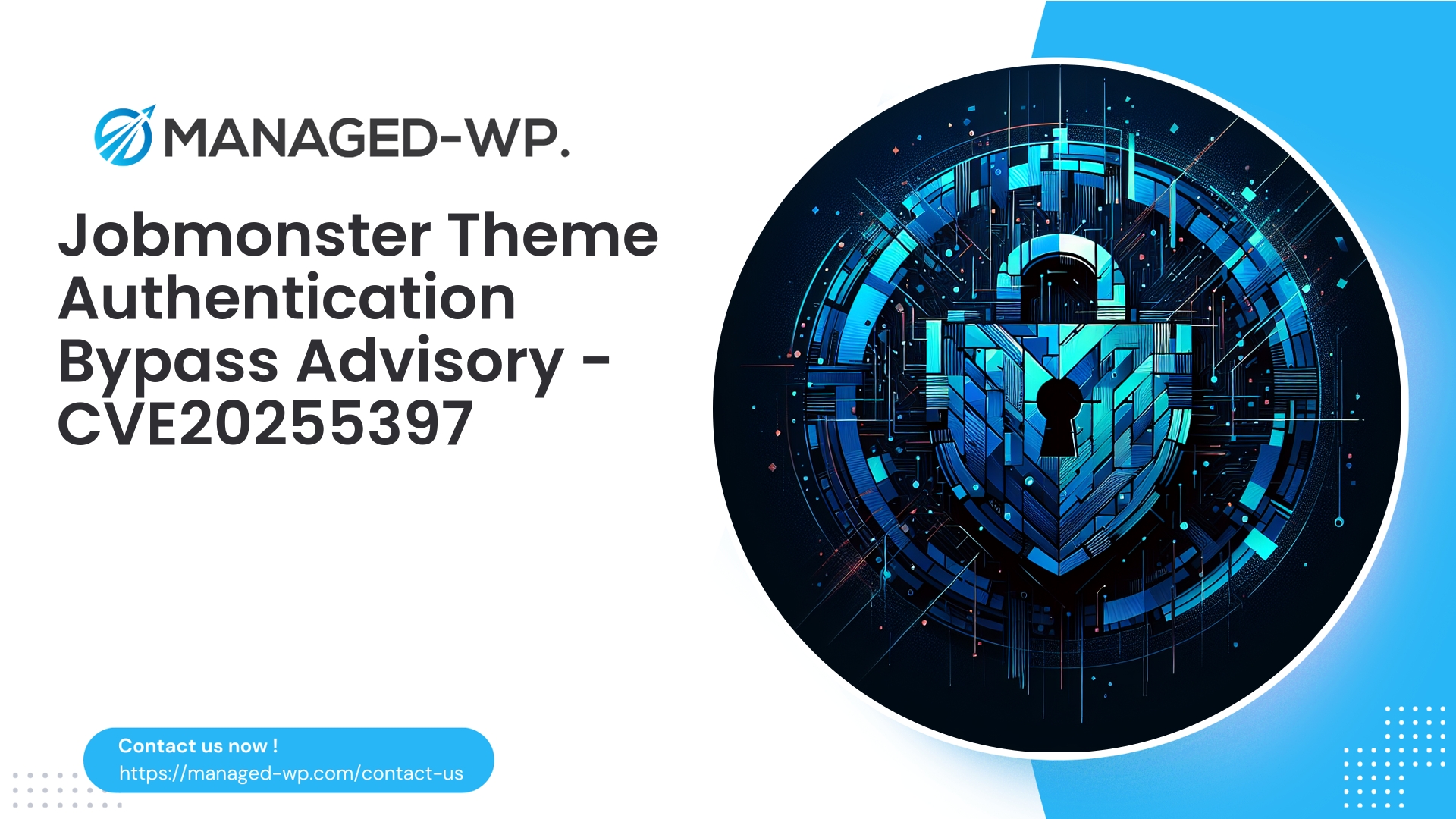| 插件名称 | 分析专业版 |
|---|---|
| 漏洞类型 | 未经身份验证的数据泄露 |
| CVE编号 | CVE-2025-12521 |
| 紧急 | 低的 |
| CVE 发布日期 | 2025-10-31 |
| 源网址 | CVE-2025-12521 |
关键安全公告:Analytify Pro(≤ 7.0.3)未经身份验证的敏感数据泄露(CVE-2025-12521)
作为美国领先的 WordPress 安全专家,Managed-WP 持续追踪 WordPress 生态系统面临的新兴威胁,并提供一线防护。近期披露的一个漏洞影响 Analytify Pro 7.0.3 及更早版本。该漏洞已被确认为: CVE-2025-12521该安全漏洞允许未经身份验证的人员访问本应受到保护的敏感分析数据。
本建议详细分析了风险、技术细节、潜在攻击方法、检测指南和实际缓解措施,使网站所有者和安全团队能够及时采取专家指导的防御措施。
重要的: Analytify Pro 7.0.4 版本已提供修复此漏洞的补丁。网站所有者应立即优先更新。对于无法及时更新的用户,Managed-WP 通过应用层防火墙配置和虚拟补丁提供战略性保护,以最大限度地降低风险。
执行摘要 – 快速行动计划
- 受影响版本: Analytify Pro ≤ 7.0.3
- 漏洞: 未经身份验证的敏感数据泄露(OWASP A3)
- CVE标识符: CVE-2025-12521
- 严重程度: 中等程度(CVSS 评分约为 5.3)——影响数据机密性,但不直接执行代码。
- 补丁可用: 版本 7.0.4 — 立即应用
- 立即采取的缓解措施:
- 立即将插件升级到 7.0.4 或更高版本。
- 轮换与插件关联的任何 API 令牌或 OAuth 凭据。
- 针对 Analytify 端点的异常请求的审计日志。
- 部署 WAF 规则或虚拟补丁,阻止未经身份验证的访问模式,直到打上补丁为止。
- 进行现场完整性扫描并监控可疑活动。
用通俗易懂的方式理解漏洞
此漏洞允许任何访客(即使未登录您的网站)通过插件端点检索机密分析数据。此类数据可能包括详细报告、API 密钥或令牌,从而可能导致下游未经授权的访问。
虽然这不允许直接接管网站或执行代码,但分析凭证的泄露可能会造成严重的运营后果,包括未经授权的数据收集、转移到其他关联服务以及使攻击者能够进行更广泛的侦察。
由于攻击者无需任何凭证即可利用此漏洞,因此该漏洞可能允许对数千个易受攻击的网站进行大规模自动扫描和数据收集。
为什么该漏洞被评为中等而非严重?
- 该漏洞会泄露数据,但不会立即导致网站被攻破。
- 数据主要限于分析相关信息,而非完全的管理控制。
- 供应商已发布补丁——更新补丁可有效降低风险。
- 然而,泄露的代币可能会被用于连锁攻击,如果不加以解决,将会加剧事件的严重性。
即使 CVSS 评分为中等,任何凭证或令牌的泄露都应严肃对待并立即补救。
技术根本原因
这类漏洞通常源于:
- REST 或 AJAX 端点缺少功能(授权)检查。
- 基于可预测查询且未经身份验证的端点返回敏感数据。
- 开发/测试代码中嵌入的机密信息泄露到生产环境中。
- nonce 验证处理不当或缺失。
- JSON 或导出端点的访问控制配置错误。
从根本上讲,数据传输无需验证请求者的授权。
潜在攻击场景
- 侦察: 攻击者可以分析网站流量、用户行为和引荐模式,从而策划有针对性的攻击,例如网络钓鱼。
- 代币盗窃: 暴露的 API 密钥允许攻击者获取历史分析数据或篡改跟踪配置。
- 连锁攻击: 将这些数据与其他漏洞结合起来,可能会导致权限提升或持续入侵。
- 竞争性间谍活动: 恶意行为者可能大规模收集分析数据,以获取不正当的商业优势。
由于无需身份验证,攻击者经常运行自动扫描——因此迅速采取缓解措施势在必行。
分步补救指南
- 更新插件: 立即应用 7.0.4 或更高版本。
- 轮换凭证: 假设插件使用的所有 OAuth 令牌、API 密钥和客户端密钥均已泄露;撤销并替换它们。
- 审计日志: 检查访问日志和插件日志,查找端点(例如)上的异常/意外请求。
/wp-json/*/analytify/*或者admin-ajax.php?action=analytify_*. - 扫描是否存在漏洞: 执行恶意软件扫描和完整性检查;确认没有未经授权的管理员用户。
- 部署WAF/虚拟补丁: 实施规则,阻止针对易受攻击端点的未经授权或未经身份验证的请求,直到确认更新为止。
- 备份与测试: 请确保有最新的备份。尽可能在测试环境中测试更新,以保证正常运行时间。
- 交流: 根据情况通知内部安全团队或客户,尤其是在用户数据可能间接受到影响的情况下。
监测检测指标
- 无需登录即可向插件特定的 JSON 端点发送请求并返回数据。
- 来自已知用于扫描的 IP 地址或 IP 地址范围的大量或重复访问。
- 指示自动化工具的用户代理(例如,python-requests、curl)。
- 对通常会被拒绝为 401 或 403 的请求,意外地返回了 200 OK 响应。
- 从您的服务器发出的向第三方分析提供商发出的出站 API 请求激增。
根据您网站的插件设置和端点,自定义监控规则。
推荐的WAF虚拟修补措施
- 阻止对插件的管理端点或数据返回端点的未经身份验证的 GET 请求。
- 限制敏感端点的方法(例如,强制只允许 POST 方法)。
- 检查传出的响应是否存在 API 密钥、令牌或密钥泄露。
- 设置速率限制以降低自动扫描器的流量。
- 阻止或质疑信誉不佳的可疑用户代理和 IP 地址。
笔记: 必须仔细测试虚拟补丁,以避免破坏合法的用户功能,尤其是面向公众的功能。
Managed-WP 如何保护您
Managed-WP 的 WordPress 安全平台通过以下方式主动保护网站免受此类漏洞的侵害:
- 快速规则部署: 当漏洞出现时,会立即推送高精度的缓解规则。
- 虚拟修补: 在应用补丁之前,从服务器端阻止攻击向量。
- 凭证泄露检测: 网站流量中密钥或令牌泄露时触发警报。
- 异常检测: 行为分析可以及早发现恶意扫描和攻击。
- 专家补救支持: 为凭证轮换、事件响应和持续安全加固提供指导性帮助。
我们的托管方案包含标准托管环境中无法提供的多层安全保护。
更新后验证清单
- 使用未经身份验证的请求测试易受攻击的端点,以验证敏感数据的阻止情况。
- 请确认已被撤销或轮换的凭证不再被第三方服务接受。
- 运行恶意软件和文件完整性扫描,检查是否存在残留的入侵迹象。
- 确认监控仪表盘中没有可疑流量或警报。
- 考虑启用插件自动更新功能,以便及时进行后续补丁修复。
识别妥协迹象
- 分析提供商控制面板中出现不规则或未经授权的 API 请求。
- 意外新增管理员帐户或WordPress用户角色变更。
- 您的主机环境发起了未知的出站网络连接。
- 插件文件发生更改、出现无法识别的计划任务或未知上传内容。
- 访问量极低的页面流量激增,表明存在侦察行为。
如果怀疑系统遭到入侵,应立即隔离受影响的系统,收集取证证据,轮换凭证,并根据需要从干净的备份中恢复。
沟通与协调最佳实践
- 优先对访问量和流量最高的网站进行修补和监控。
- 如果涉及敏感分析数据,请通知相关利益攸关方和合规官。
- 将此漏洞纳入您当前的插件安全审查和更新流程中。
插件开发者应检查所有返回 JSON 的端点,确保其具备适当的功能,并构建自动化测试以防止回归问题。
安全加固建议
- 遵循最小权限原则;避免授予过多的权限或范围。
- 在可行的情况下,优先选择生命周期短、可再生的代币,而不是生命周期长的凭证。
- 使用密钥管理解决方案,而不是将敏感密钥直接嵌入插件设置中。
- 保持所有插件和 WordPress 核心软件为最新版本,并进行测试环境验证。
- 部署具备虚拟修补功能的高质量WAF。
- 定期对关键插件进行代码审核和安全测试。
- 持续监控访问日志,以发现异常或未经授权的活动。
常见问题
问:如果我无法立即更新,是否应该卸载 Analytify Pro?
答:卸载可以降低风险,但前提是必须删除所有相关文件和配置,包括凭据。不过,升级通常更安全快捷,因为卸载操作不当可能会导致网站功能损坏。
问:这个漏洞是否意味着我的网站已经被攻破了?
答:不一定。数据泄露漏洞会暴露信息,但并不一定意味着已被实际入侵。不过,仍应假设暴露的令牌可能被滥用,因此需要轮换凭证并进行彻底扫描。
问:公开的分析 ID 是否存在安全风险?
答:仅凭分析 ID 通常风险较低。真正的威胁在于 API 凭证或具有特权访问权限的令牌泄露。
概念性WAF规则模式
- 阻止对管理 JSON 端点的未经身份验证的 GET 请求:
如果请求路径匹配“^/wp-json/.*/analytify/.*”并且方法=GET并且没有有效的WordPress身份验证cookie,则阻止。 - 阻止管理员 Ajax 调用泄露数据:
如果请求路径 == “/wp-admin/admin-ajax.php” 且查询字符串包含 “action=analytify_” 且没有有效的身份验证 cookie,则阻止该请求。 - 限制插件相关请求的速率:
如果单个 IP 地址每分钟发送超过 50 个插件特定请求,则暂时封禁该 IP 地址 1 小时。
规则必须经过精心制定和测试,以避免干扰合法功能。
事件响应检查表
- 立即将插件更新至7.0.4版本。
- 轮换所有 OAuth 令牌和 API 密钥。
- 进行全面的恶意软件和文件完整性扫描。
- 检查服务器、插件和WAF日志,查找可疑请求。
- 应用虚拟补丁/WAF保护,直到补丁安装完成。
- 如果检测到入侵行为,则从干净的备份中恢复。
- 如有需要,通知相关利益方。
- 加强访问控制并安排后续审计。
主动修补的重要性
未经身份验证的数据泄露漏洞是自动化扫描和数据收集活动的主要目标。依赖隐蔽性的网站尤其容易受到大规模攻击。将快速修补与多层防御措施(例如 Web 应用防火墙 (WAF)、凭证轮换和实时监控)相结合,可以显著降低漏洞发生的可能性和潜在影响。
Managed-WP 安全平台的优势
- 快速部署: 我们快速交付虚拟补丁,在客户协调官方更新的同时,为客户站点提供屏蔽保护。
- 增强可见性: 我们的平台汇总来自多个站点的数据,以便快速检测和优先处理新出现的威胁。
如果您选择自行管理,请确保您的组织拥有强大的自动化和监控功能,以便在数小时内(而不是数天内)发现问题并做出响应。
Managed-WP Security 入门指南
我们的免费入门级安全套餐提供基本防护,非常适合中小型场所:
- 托管式 WordPress 防火墙,重点防御核心和插件攻击。
- 自动扫描恶意软件并针对常见漏洞发出警报。
- 在安排补丁更新的同时,无需任何成本即可增加安全层。
了解更多信息并在此注册: https://managed-wp.com/
最后的想法
Analytify Pro漏洞凸显了复杂插件生态系统固有的风险。敏感端点上缺失或不足的访问控制可能导致关键数据暴露给攻击者。最快的修复方法是应用补丁、轮换密钥并进行严格监控。
管理多个站点的组织应考虑使用托管 WAF 和虚拟补丁解决方案,例如 Managed-WP,从而显著缩短漏洞披露和实际利用之间的暴露窗口。
我们的团队可以协助您进行漏洞评估、自定义防火墙配置和实际操作的修复计划——所有这些都是根据您的 WordPress 环境量身定制的。
保持警惕,及时了解最新信息,并主动保护您的网站安全。
— Managed-WP 安全团队
采取积极措施——使用 Managed-WP 保护您的网站
不要因为忽略插件缺陷或权限不足而危及您的业务或声誉。Managed-WP 提供强大的 Web 应用程序防火墙 (WAF) 保护、量身定制的漏洞响应以及 WordPress 安全方面的专业修复,远超标准主机服务。
博客读者专享优惠: 加入我们的 MWPv1r1 保护计划——行业级安全保障,每月仅需 20 美元起。
- 自动化虚拟补丁和高级基于角色的流量过滤
- 个性化入职流程和分步网站安全检查清单
- 实时监控、事件警报和优先补救支持
- 可操作的机密管理和角色强化最佳实践指南
轻松上手——每月只需 20 美元即可保护您的网站:
使用 Managed-WP MWPv1r1 计划保护我的网站
为什么信任 Managed-WP?
- 立即覆盖新发现的插件和主题漏洞
- 针对高风险场景的自定义 WAF 规则和即时虚拟补丁
- 随时为您提供专属礼宾服务、专家级解决方案和最佳实践建议
不要等到下一次安全漏洞出现才采取行动。使用 Managed-WP 保护您的 WordPress 网站和声誉——这是重视安全性的企业的首选。



















